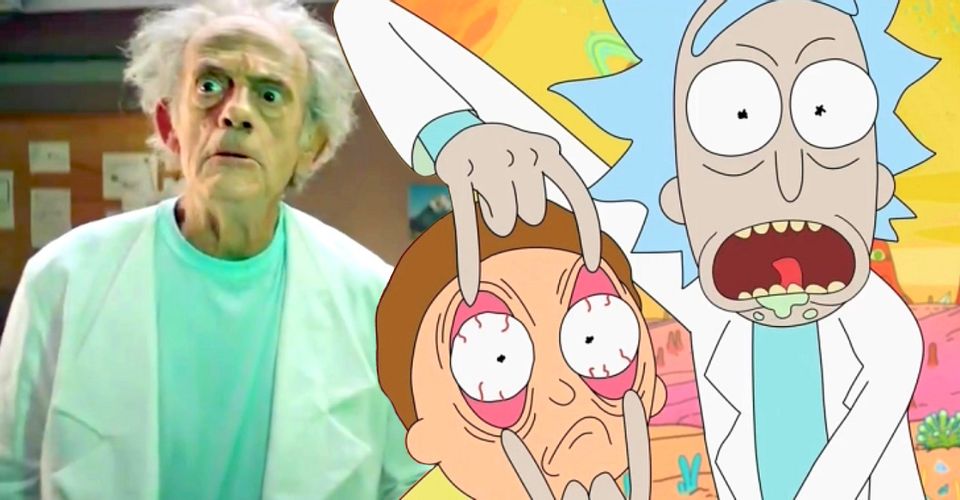Why A Rick & Morty Movie Is A Bad Idea (Live-Action Or Not)

There has been great debate among Rick & Morty’s fandom over who should direct the show’s movie and whether or not the feature-length spinoff should be live-action, but this all ignores the larger issue—that Rick & Morty doesn’t need a movie. In recent years, the prospect of a Rick & Morty movie has been a source of much discussion among the show’s sizable fandom. Directors as notable as James Gunn and Zack Snyder have been asked for their takes on the material, and the question of whether the movie should be shot in live-action or stick to the show’s animated style has led to further division.
It is no surprise that fans expect Rick & Morty to spawn a feature-length movie sooner or later. After all, the show is intensely cinematic, with sprawling stories, impressively dynamic action sequences, a vast cast, and no end of narrative ambition. Thus, the idea of a Rick & Morty movie appeals to many fans as it would give the creators an even bigger canvas (and budget) to work with.
However, although a lot of ink has been spilled over the potential of a live-action Rick & Morty movie, the questions of who would direct it and what medium it would be made in are secondary to a bigger problem. The entire debate ignores a more obvious issue for the franchise: Rick & Morty doesn’t need any feature-length movie. Although the show could likely tell a satisfactory story in two hours rather than its usual twenty minutes, there’s no reason for Rick & Morty to make this format switch when the series is currently going from strength to strength as a semi-serialized TV show.
Adult Animation Movies Have Never Really Worked

As a whole, adult animated TV shows don’t have the worst track record when it comes to their theatrical spinoffs. For example, 1999’s South Park: Bigger, Longer, and Uncut was a triumph with critics and even earned an Oscar nomination. Although South Park’s intensely timely satire means the show will likely never make another theatrically-released movie, that spinoff struck while the iron was hot and arrived in cinemas at the height of South Park’s popularity as a TV phenomenon. It was an extension of a new, exciting series, and it arrived before South Park changed into a show with a one-week turnaround time that allowed the creators to comment on topical events.
In contrast, since the show has been around since 2013, Rick & Morty’s movie would already be a spinoff of a well-established cult hit. Rick & Morty’s movie would be more like The Simpsons Movie, save for the fact that that long-awaited hit waited until season 17 before producing a theatrical release. Although Rick & Morty is setting up season 6 already, the series is still a full decade from being as well-established as The Simpsons was when the show made the jump to the big screen. Still, it has also missed the early transition to movies that South Park pulled off within its first three seasons. Like 2022’s upcoming The Bob’s Burgers Movie, a Rick & Morty feature-length spinoff would be stuck in the hinterland of not being as new and fresh as South Park was, but also not as influential and long-established as The Simpsons when the two shows made their respective big-screen debuts.
Rick & Morty Is Already (Too) Cinematic

Rick & Morty’s fast-paced storytelling is already as ambitious as many movies (meaning it doesn’t necessarily need a movie spinoff). Its pace would be almost impossible to maintain for a full-length feature. For an example of this issue, it is worth revision the reaction to Rick & Morty’s two-part season 5 finale. The second episode was a critical hit, but the outing managed to cram an absurd amount of storytelling in its twenty-minute runtime. The plot involved rewriting Rick & Morty’s entire canon, destroying one of the show’s central plot devices, and permanently altering the tone of the series—and still, some reviewers found that the first half dragged thanks to the sheer speed of Rick & Morty’s storytelling.
The fact that some reviewers and fans accused Rick & Morty’s season 5 finale of including padding despite how much plot the series packed into its brief runtime proves there are few stories that the show needs two hours to tell. This also leads to the question of what sort of plot the proposed Rick & Morty movie would have. A silly story like Rick & Morty’s “Rickdependence Spray” (season 5, episode 4) could anger fans who wanted something more substantial, while a more self-serious movie could go against the show’s anarchic, absurd sense of humor. Sustaining the balance between pathos and goofy, self-aware silliness is difficult enough in twenty-minute installments, and extending the runtime to two hours could kill Rick & Morty’s delicate tonal balance.
Rick & Morty’s Most Important Plots Take Time

On the subject of plot, the central issue with Rick & Morty’s proposed movie is that the show’s storytelling is uniquely suited to the medium of TV. Standalone Rick & Morty adventures are admittedly a lot of fun, and the show has told plenty of enjoyable stories that could have been made for engaging movies if they were expanded to feature-length. While Rick & Morty’s Hellraiser spoof may be the sort of insubstantial, light-hearted outing that is best suited to TV, the show’s forays into the Citadel have always had sufficient scope to sustain a bigger, more ambitious story. However, Rick & Morty’s most important stories—the lead’s character arcs—benefit from the pace of TV writing, which allows them to grow and change over time.
As proven by season 5, Rick and Morty themselves have changed since their pilot incarnations. Rick has grown gradually more self-aware and been humbled, with this sometimes resulting in him reaching out to others and sometimes leading him back into self-pitying isolation. Morty, meanwhile, has grown more self-sufficient and assured, evolving away from the uncertain, nervy character seen in the early outings of the show. However, these sort of big-picture shifts in Rick and Morty’s philosophical outlooks and characterizations are not the sort of stories that work well on the big screen, as they require more screen time for the subtle changes in a character’s persona to gradually become evident in their actions. This is the sort of character growth that made Rick & Morty’s season 5 finale so satisfying, but it is the very same sort of storytelling that is ill-suited to the self-contained nature of a feature-length spinoff of the series.
About The Author


















